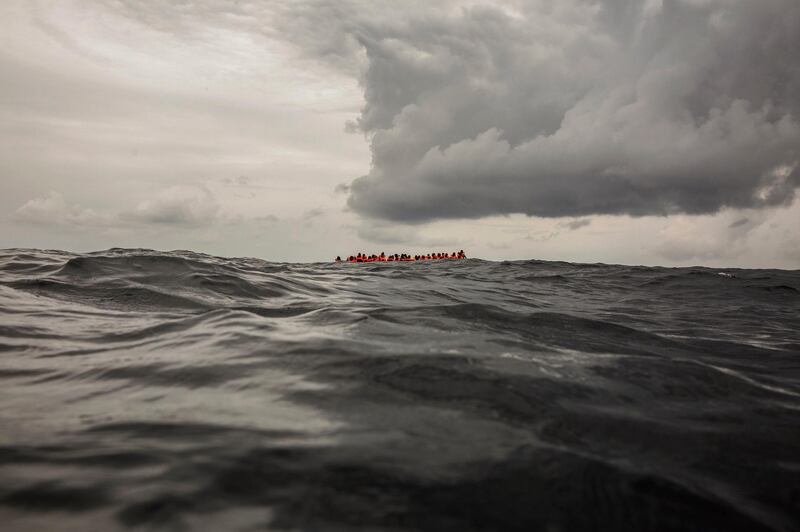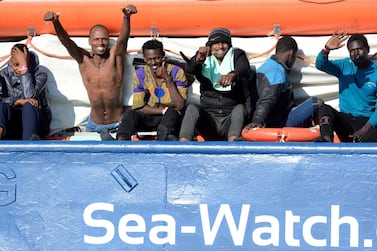As the renewal deadline for the EU’s military anti-smuggling operation in the Mediterranean draws near, disagreements between EU nations are putting the mission at risk.
Operation Sophia’s mandate involves efforts to “identify, capture and dispose of vessels and enabling assets used or suspected of being used by migrant smugglers or traffickers” and has been expanded to include training Libyan coastguard organisations and navy and implementing the UN arms embargo off the coast of Libya.
Italy is central to the operation, which largely took over from its own Mare Nostrum programme, which rescued over 150,000 people from the Mediterranean in a year. Operation Sophia is led by an Italian and Italian forces have been a the forefront of training the Libyan coastguard.
However, the mission is in danger of ending if a deal to renew it cannot be reached between EU nations with differing agendas by March 31. Italy’s right-wing Interior Minister Matteo Salvini has threatened to obstruct renewal of the programme, citing an unfair burden on Italy to take in refugees who land there.
Germany, which pulled its ships out of the operation in January due to lack of action, wants renewal and reform of the operation, as does France whose President Emmanuel Macron called for closer cooperation between EU nations on asylum seekers.
The threat of cancelling Sophia may not be as damaging as Germany and other EU nations are portray it to be, says Dr Julia Himmrich, research associate at the Dahrendorf Forum. The operation has myriad problems which seem intractable, given the impasse between EU nations and with refugee host nations in North Africa.
Although the policy has contributed to migrant arrivals falling by 85 per cent in 2018 compared to 2015, the proportion of those who have died making the crossing has risen, UN figures show.
One of the largest issues is the inappropriate deployment of the military to deal with the migrant issue, she says.
"When you speak to people from the military, they are not that excited about this involvement in migration,” she told The National.
The military members of Operation Sophia Dr Himmrich has spoken to say they are not trained for humanitarian work, feel resources could be used better elsewhere and do not want to become a target for public ire by following political rather than military orders.
Dr Himmrich says many of the functions the military coalition is fulfilling would be better served by existing EU bodies including European border agency Frontex, law enforcement body Europol, and the European Union Agency for Asylum.
The mission’s mandate has been subject to constant amendment as the EU, home nations of refugees and departure points from North Africa and Turkey try to agree terms to limit migration to the EU, handle asylum applications and lessen the number of drownings in the Mediterranean sea.
One such amendment from October 2016 involved EU nations, led by Italy, training the Libyan coastguard to identify and halt smugglers and rescues refugees stranded in Libyan waters.
However, leaked reports published by US news outlet Politico showed some members of the coastguard were found to have been taking part in smuggling operations themselves and were not prepared to rescue people from the water safely.
The Italians and northern Europeans are at odds over the future of the programme, and the issues have no been resolved since a three-month "technical roll-over" was approved in December
Some called Mr Salvini’s idea, along with a recent decision to close Italian ports to rescue boats a bold-faced attempt to appeal to the far right ahead of European elections in May.
Italy's decision to close ports to rescue boats has further complicated the matter, leading commercial ships to leave refugees to flounder in the water, said Hassiba Hadj-Sahraoui, MSF’s Humanitarian Affairs Advisor.
“For a commercial ship to be stuck at sea for several days, if not weeks, with people on board and this total impasse where you don't know where you could disembark them is not something viable,” she told the National.
Although rescuing stricken crafts is not part of Sophia’s official mandate, ships encountering those in trouble on the water are bound by maritime law to rescue them. But the EU is considering shirking even this most basic responsibility, a 2017 leaked status report said.
“Consideration should be given to an option that would allow the operation to be authorised for being temporarily exempt from search and rescue when actively conducting anti-smuggling operations against jackals in international waters,” the report read.
“From the perspective of saving lives, the renewal or non-renewal of Operation Sophia is not going to make such a huge difference because they have been trying to operate further from the coast of Libya ... to avoid having to make these rescue operations," said Ms Hadj-Sahraoui.
However, where Sophia may be missed is in providing information to the coastguard as to where crafts in difficulty are located.
“Operation Sophia has been at least able through reconnaissance flights or through their presence to signal to coast guards that there was a ship in distress. So if it were not to be renewed, we would not even have that and we would likely see more deaths, not because people cannot be saved, but because people don't even know if they were in distress in the first place."








